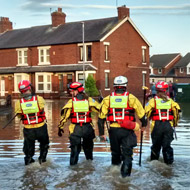
Rescue teams contend with extremely dangerous conditions
RSPCA rescue teams have been working hard to save animals and people from the severe flooding caused by Storm Desmond.
Trained specialists from the animal charity have so far rescued 36 people and 22 animals, including dogs, cats, rabbits and chickens.
Among them was a semi-conscious elderly man who had to be stretchered out of his nursing home in Carlisle and transported on an RSPCA boat, before he was taken to hospital.
The RSPCA say that they have received 77 calls about flooding incidents since last Friday. Twenty flood trained officers from across England and Wales travelled to join their colleagues in Cumbria and Northumberland to assist in the ongoing rescue operation.
Inspector Ben Strangwood, who has coordinated the RSPCA’s flood response, said: “It has been a huge challenge as the flooding is so widespread across a large geographical area.
“Although the water levels are receding in some areas, elsewhere the water levels are expected to remain quite high which is leaving many roads inaccessible. It is extremely difficult to get around to where we need to be.
“We have received a lot of calls, mainly to help people who have had to leave their animals when they have evacuated their homes. However, we have also had to contend with extremely dangerous conditions and fast flowing water.”
As well as the RSPCA, members of the fire service also came to the aid of animals in peril. One very lucky sheep found himself in trouble as water began to pour into his field. Thankfully his rescuers were able to lift him out and chauffeur him back to safety in a dinghy.
Meanwhile in Ireland, a donkey wandered into flood waters after strong winds blew down his shed and the gate of his paddock.
Animal Heaven Animal Rescue put out a message on their Facebook page asking for help to rescue the donkey after its owner contacted the charity.
Fortunately rowing club coach Mike Fleming came to the rescue with a boat. The charity has named the donkey Mike in his honour.
Image (C) RSPCA



 The latest
The latest